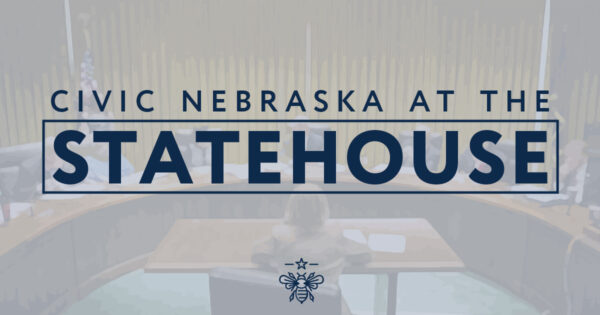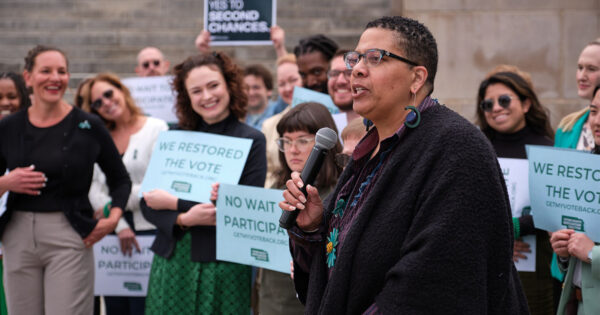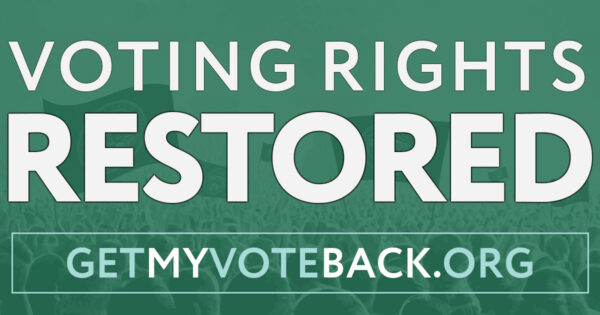Thank you, Secretary Evnen. My name is Mike Forsythe. I represent Civic Nebraska, a statewide nonprofit advocating for a more modern and robust democracy for all Nebraskans. I’m here to provide information about why voter ID would be harmful to Nebraska.
 I’d like to start by quoting Article I Section 22 of the Nebraska Constitution: “All elections shall be free; and there shall be no hindrance or impediment to the right of a qualified voter to exercise the elective franchise.”
I’d like to start by quoting Article I Section 22 of the Nebraska Constitution: “All elections shall be free; and there shall be no hindrance or impediment to the right of a qualified voter to exercise the elective franchise.”
Meanwhile, the Oxford English Language Dictionary defines “Democracy” in certain terms: a system of government by the whole population or all the members of a state, typically through elected representatives.”
It doesn’t mean “a certain part of the population, or SOME of the eligible members of a state.” ALL means ALL.
For thousands of Nebraska voters, voter ID would be a hindrance and impediment to freely cast a ballot. Our state proudly entered the Union at the forefront of the voting rights fight; from the very beginning, Nebraska’s state Constitution enshrined powerful protections against unnecessary barriers to the franchise. This hasty rewrite seeks to extinguish these protections, while at the same time reducing Nebraskans’ ability and opportunity to vote.
We cannot have free and fair elections if we’ve stripped thousands of citizens of what is a fundamental constitutional right. Many of these citizens have fought for this country, or grow our food, teach our children, and have dedicated their lives to making their communities the best they can be.
At least 54,500 voting-age Nebraskans do not have a valid, government-issued ID that would be required to vote under Initiative 432. This figure doesn’t include the thousands of Nebraskans who may have moved, gotten married, changed their name, changed their appearance, or had any other life change that isn’t reflected on their current driver’s license. Getting glasses, changing weight or a new hairstyle shouldn’t keep people from qualifying to vote. That’s the difference between having a current ID that allows you to drive and a valid ID. If this becomes law, some of the people who think they support voter ID will get to the polls and find that they have disqualified themselves from voting.
Fifty-four thousand, five hundred people would be the fourth-largest city in Nebraska. That’s not nothing, folks. It represents a lot of Nebraska voters – especially disabled voters, rural voters, senior voters, low-income voters, college students, or any eligible voter who for whatever reason is without government-issued photo identification. Despite the assumption that everyone has a “proper ID,” the fact is, that many Nebraskans don’t. We don’t all live the same life. And we have to take that into account when taking on the responsibility of making policy for all of us.
A state-issued ID in Nebraska costs $29. Forcing citizens to pay a fee in order to vote is akin to a poll tax, a disgraceful and illegal relic of the Jim Crow era. In an attempt to remain constitutional, lawmakers will likely find that they must allocate taxpayer funds to cover the cost for everyone to have valid IDs. A similar bill introduced in 2018 estimated it would cost Nebraska taxpayers $2.9 million dollars to foot the bill for voter ID restrictions like these. That’s just for the first year alone. Each year after that, maintaining this policy would cost upwards of $750,000 dollars. And these are pre-inflation estimates. That’s money that could otherwise go to highways, state parks, infrastructure, or tax relief.
Requiring all these new IDs would likely mean opening new ID-issuing agencies or expanding existing agencies’ hours; adding more technology to produce more IDs where needed; creating or revising voter information and outreach materials to reflect the change; creating longer lines at the polls; and spending untold hours training everyone at the state and county levels on all of the changes, as well as paying for the extra hours required to generate the cards. As it is, DMVs in counties in this area aren’t open full time and would need to expand hours to accommodate new demand. That’s going to cost millions more. And that’s needless government spending.
It’s fair to wonder why Voter ID can be required at stores, bars, banks, and to drive, but not to vote. Here’s the answer: Shopping, drinking, banking, and driving are not civil rights that are enshrined in both the U.S. and Nebraska Constitutions. Our democratic republic is not supposed to be transactional, like going to the store. For eligible and registered voters, there should absolutely be no impediment to exercising that right.
If this measure were passed, it would make it one of the most restrictive voter ID bills in the country. In 42 states, some with voter ID, it would be easier to vote than in Nebraska. Most states with identification requirements accept many different kinds of IDs. Nebraska would become one of the most narrow and restrictive states in the nation in terms of the kind of ID that would allow you to vote.
Depending on how the final bill is written, it could mean no birth certificates. No Social Security cards. No student, business, tribal IDs, or even some military IDs. Even a valid, unexpired driver’s license could be suspect if any of your information has changed. If so, you might rightly think your ID is still current. But it might not be “valid” under the final bill. Should we really be voting to enact something before we know the details on how it would be carried out?
The voter ID measure’s language is also atypical of ballot measures in that it doesn’t actually specify the final language of the law to be enacted. It simply directs the Legislature to do something. That’s contrary to the purpose of ballot measures, which are intended to enable voters to directly enact laws.
Imagine needing to make photocopies of your ID – twice – to first request and then cast an absentee ballot. Imagine being turned away from your polling place on Election Day, perhaps after a long drive, because a part-time poll worker is put in the awkward position of having to tell you your ID doesn’t qualify. Imagine having to wait to cast a provisional ballot because of a question about your ID. And imagine having to wait in long lines to vote because of all these complications. In Nebraska.
Since the pandemic, many of us have grown to prefer to vote by mail. About half of us are doing so. The irony of this ballot language is that it would likely require voters who choose to vote by mail to send copies of their personal identification through the mail with their ballots. First of all, lots of people don’t have access to a printer at home. And worse, this creates a much greater opportunity for security problems by now creating an incentive for people to intercept ballots to harvest personal data about Nebraskans for purposes of identity theft. This could have catastrophic ramifications for all of us.
Gov. Ricketts and Secretary of State Evnen have stated that a strict voter ID requirement would be a “proactive” approach to ensure our elections aren’t subject to widespread voter fraud. Conversely, they’ve also stated that Nebraska’s elections, conducted by our election commissioners and county clerks, are administered with integrity and that our votes are safe, secure, and certified.
Our current process requires voters to present proper identification when they register and then sign an affidavit when they vote, both in person or via absentee ballot. So Nebraska voters already do certify our identification – when we register to vote. Then, we re-verify our identities each and every time we cast a ballot by signing affidavits, either at our polling places on Election Day or on our vote-by-mail envelopes before we return them, under the threat of harsh legal penalty if we lie.
There have been ZERO prosecutions for voter impersonation fraud recorded in the last 50 years. If there ever were, that’s a Class IV felony. A restrictive Voter ID requirement won’t prevent fraud–since it doesn’t exist–but it will also have little to no effect on improving perceptions of election integrity. In Arizona and Georgia, fraud claims persist to this day. Both of these states have strict identification requirements, but that doesn’t keep bad actors from alleging that the elections were fraudulent.
Civic Nebraska has always advocated for elections to be fair, modern, and accessible. We advocate for measures that protect our rights and work to defeat bad policies that threaten the right for all of us to vote. Voter ID bills have come before the Legislature since 2011 and they’ve been shot down every time by our majority Republican senators. The reason they’ve done this for over 10 years is because it’s a bad idea.
I encourage voters to visit NoTo432.org to learn more about the consequences of this needless policy.
As we all decide how we’ll vote on this ballot measure, we should be asking ourselves whether or not it’s a good policy. That’s our obligation as voters. To make informed decisions on the ballot. As we all consider this, we should be answering a series of questions to evaluate voter ID:
1. Is there a clear problem that would be solved? The answer is no.
2. Is there evidence that the policy will be effective? Also, no. In fact, enacting the policy will result in turning willing, eligible voters away.
3. Is it expensive? Very.
4. Is that expenditure the most effective use of taxpayer dollars right now? Certainly not.
5. And is this ballot measure written in the most effective and responsible form? No. It simply directs the Legislature to do something. That’s contrary to the purpose of ballot measures, which are intended to enable voters to directly enact laws.
Election security is a hot topic right now and people clearly care about it. We all should. The good news for all of us is that Nebraska’s elections are historically secure and that we don’t have a voter impersonation fraud problem here because of the security measures we employ. For those who say we should enact voter ID anyway just in case, there is also zero valid evidence proving that voter ID laws even make anyone feel that their elections are more secure.
Two years ago, researchers sampled more than one billion instances of voter behavior collected in states with voter ID laws between 2008 and 2016. They concluded, quote, “Voter ID laws have no effect on fraud, either actual or perceived. … We find the laws had no significant effect on the perceived occurrence of voter impersonation, multiple voting or noncitizen voting.”
Nonetheless, this policy would deny at least 54,500 eligible Nebraska voters from being able to vote because they don’t have a valid, government-issued ID required under Initiative 432. There will be thousands more who think they have a valid ID but don’t. We should take this very seriously.
This is not a partisan issue. This is a constitutional issue – and we can’t just casually throw away our rights in exchange for useless security theater. Voters have a huge responsibility to make the right call to protect the rights of all Nebraskans, and we need to be informed about its consequences. It’s been proven to be more difficult for older voters, low-income Nebraskans, young people and students, Black and brown voters, and rural Nebraskans to obtain, and maintain, what would likely constitute a “valid” ID under this ill-advised proposal. That’s not in dispute.
Voter ID is government bureaucracy at its worst. Those who truly want to enact laws that are proven to improve our electoral system could consider a variety of legislation that would improve our voting system while not preventing anyone from being able to vote.
Spreading disinformation about unfounded and unproven voter fraud foments mistrust in our election systems. This is particularly problematic when it is amplified by state officials. It also fails to appreciate the thousands of Nebraskans across the state who faithfully conduct safe and secure elections. By all accounts, these Nebraskans have done so very successfully and their commitment should be commended.
The biggest problem with our elections is that many of Nebraska’s eligible voters are choosing not to vote. If politicians truly want to strengthen our elections, they should do all they can to encourage voters to participate. Spreading disinformation – and supporting unnecessary voter ID requirements – will accomplish the exact opposite.
I’d encourage anyone interested in learning more about this issue to visit NoTo432.org to get full information about the ramifications of this policy before filling out their ballot. Ultimately, this is in our hands. Now is the time for Nebraskans to stand up for our state’s values of honesty, fairness, and duty to one another by voting against Initiative 432.
I appreciate the opportunity for us to have this discussion.
![]()



